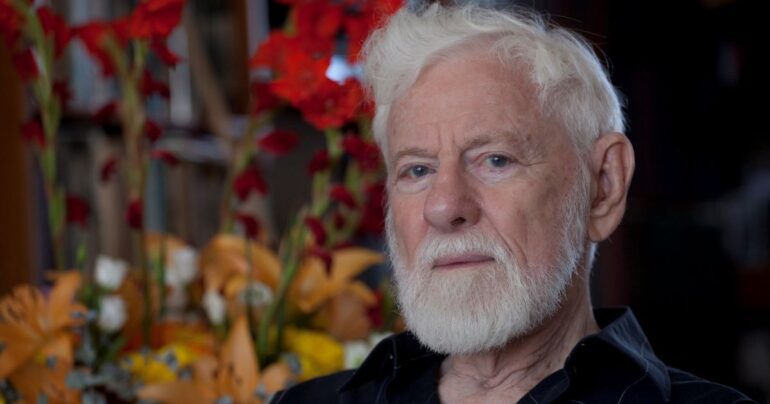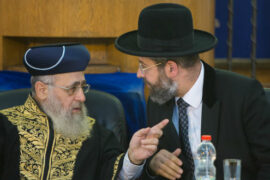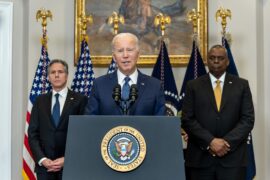Veteran journalist, lawmaker and peace activist Uri Avnery died Monday morning in Tel Aviv, just a few weeks shy of his 95th birthday.
Avnery was a Jewish underground fighter against the British occupation of Palestine in the 1940s and later became a member of Knesset for 11 years with various left-wing factions.
During the early years of the state, he worked as editor-in-chief for the HaOlam HaZeh weekly, contributed to Etgar and later penned regular opinion pieces in the Haaretz newspaper.
Avnery also founded many peace movements, including Gush Shalom in the 1990s and Semitic Action in the 1950s, which he established together with several former leaders of the Fighters for the Freedom of Israel (Leḥi) underground.
While clearly a deep and revolutionary thinker in many regards, he was regrettably obstinate in his refusal to entertain any alternative to partitioning the country into two states as the only viable solution to the Israeli-Palestinian conflict.
In 1982, Avnery became the first Israeli to meet with Palestine Liberation Organization (PLO) leader Yasser Arafat.
Throughout his life, Uri Avnery refused to use the term “Middle East” but opted instead to say “Semitic Region,” arguing that “Middle East” requires the acceptance of a Eurocentric mental framework.
In December 1960, Avnery and several comrades from Semitic Action created the Israeli Committee for a Free Algeria. The committee supported the struggle of the National Liberation Front (FLN) to free Algeria from French rule.
The group’s positions ran counter to the official policy of the Israeli government, which regarded France as one of Jerusalem’s most valued source of arms at the time.
Avnery had been introduced to members of the FLN by Egyptian radical Henri Curiel, who suggested that an independent Algeria would become Israel’s first ally in the region. In general, Semitic Action advocated for a region-wide Semitic confederation and for Jerusalem to adopt a foreign policy that would link Israel with the other Semitic peoples rather than with the imperialist powers.
Uri Avnery never avoided controversy and was involved in many fateful events in Israel’s history, some of which he documented and others he actively took part in shaping. But while his supporters saw his ideas as groundbreaking, detractors denounced him as an enemy of the Jewish people. He summarized his life by noting that while his ideals “won a resounding victory” theoretically, in practice they “were defeated politically.”
Avnery was born in Germany in 1923 and immigrated with his family to British-occupied Palestine in November 1933. After a few months in the north, the family moved to Tel Aviv, where he lived until his death.
In 1938, at the age of 15, he joined the National Military Organization (Etzel) to fight to free Palestine from British rule.
“I was convinced that we deserved independence, just like everyone else,” he recalled.
In his Hebrew-language memoir “Optimi” (“Optimistic”), Avnery wrote that his service with the Etzel taught him political lessons for later on his career: “We were freedom fighters,” he wrote. “In my eyes, the British authorities were a terrorist organization. Back then, I learned that the difference between a freedom fighter and a terrorist depends on your perspective.”
As a freedom fighter, Uri Avnery favored the idea of establishing in Palestine a single state, one in which a new nation would arise as a union of Arabs and Hebrews. He believed at that time that the Jewish national movement was a natural ally of the Arab world, and advocated cooperation between both under a joint name. “This is an ideal built on a culture partnership of homeland and history,” he said.
Accordingly, Avnery was disappointed on November 29, 1947, when the United Nations General Assembly recommended the partition of Palestine into two separate states.
“I couldn’t accept the partition of the country. Tul Karm, Hebron and Nablus were my country,” he said, adding that “The joy over carving up the country into pieces angered me a great deal. I dreamed of a joint national movement based on a common love of the land.”
But by the end of the 1948 War that ensued between Jews and Arabs once the British retreated from the country, Avnery became a staunch believer in partition. This remained his position until his death.
What’s probably most worth remembering about Uri Avnery was his fierce opposition to the authoritarian Mapai governments of the State of Israel’s early decades. Liberal Zionists often try to romanticize the Israeli society of the 1950s and early 60s as more progressive and egalitarian than Israel became following the 1967 Six Day War.





